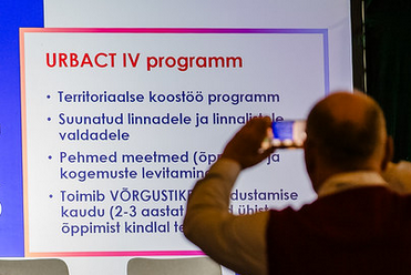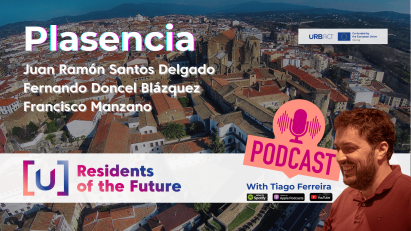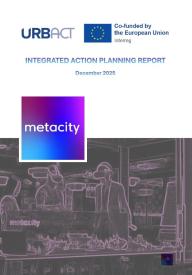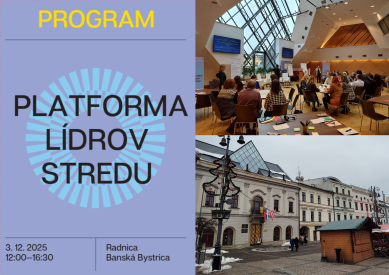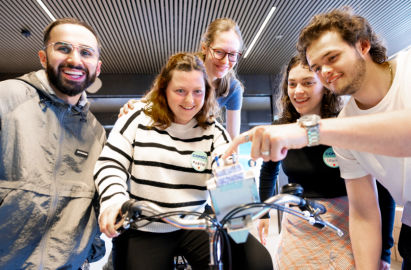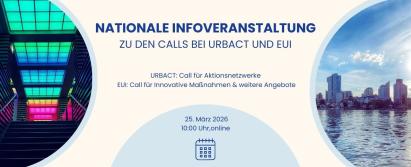În fața unor provocări complexe și interconectate, urbaniștii și oficialii municipalităților vin în căutare de modalități inventive de a face orașele mai rezistente și mai incluzive. O metodă, în special, se concentrează pe capacitarea cetățenilor și pe construirea de rețele de cooperare. „Inovația socială” devine o nouă modalitate de guvernare și de modelare a domeniului public, bazată pe inteligența colectivă a oamenilor.
Bunele practici URBACT evidențiază soluții valoroase pentru orașele europene pe teme variind de la mobilitate la locuințe, regenerare urbană verde, inovare socială și economia locală. Printre cele 116 bune practici URBACT premiate în 2024 , opt orașe se remarcă pentru munca lor în transformarea colaborării în transformare. De la capacitatea de angajare la regenerarea cartierelor, aceste practici pot fi văzute ca parte a mișcării de inovare socială: orașele trec de la furnizarea de servicii la construirea de orașe prin cooperare.
Inovația socială în orașe
Inovația socială este adesea descrisă în raport cu un bun social. În orașe, acest tip de inovație poate apărea atunci când cetățenii, funcționarii publici, cercetătorii și actorii locali experimentează împreună pentru a rezolva probleme comune , adesea în afara ierarhiilor tradiționale de putere. Cu alte cuvinte, inovația socială apare atunci când instituțiile și instituțiile publice devin suficient de poroase pentru a permite pătrunderea noilor cunoștințe, deschizând guvernanța și transformând colaborarea într-o metodă de construire a orașelor. Această creativitate colectivă, care se află în centrul inovației sociale și al capacității de a genera valoare socială prin încredere, poate consolida și amplifica un sentiment comun de scop.
În cele opt practici prezentate în acest articol, inovația socială se desfășoară prin trei căi principale:
• Orașele își transformă sistemele publice din interior
• Comunități care utilizează spațiile și rețelele ca motoare de colaborare
• Persoane care își dezvoltă abilități și autonomie pentru a-și modela propria viață de zi cu zi
În lumina cercetărilor actuale privind inovația socială, aceste practici evidențiază nu doar tipologiile instituționale, ci și diferitele logici ale schimbării.
Sisteme publice care învață și se adaptează
Instituțiile publice își reconsideră modul în care pot oferi valoare socială prin colaborare și guvernanță integrată. Aceste instituții trebuie să recunoască faptul că complexitatea necesită colaborare, iar învățarea trebuie să devină parte a guvernanței însăși.
#1 – Barcelona (ES)
Programul Làbora conectează persoanele vulnerabile aflate în căutarea unui loc de muncă cu oportunități de angajare printr-un parteneriat între consiliul local, organizațiile sociale și întreprinderi. Creat ca răspuns la creșterea șomajului, programul oferă căi integrate care combină formarea profesională, mentoratul și sprijinul pentru plasarea forței de muncă. În fiecare an, aproximativ 6.000 de persoane participă la program, iar 1.000 își găsesc un loc de muncă, recăpătându-și autonomia printr-o muncă demnă.
Inovația Làbora constă într-un nou mod de lucru: un sistem public care se coordonează cu societatea civilă, în loc să acționeze în paralel. Programul demonstrează cum colaborarea structurată dintre administrațiile locale și ONG-uri poate umaniza politicile de ocupare a forței de muncă și poate face incluziunea scalabilă.
#2 – Miskolc (HU)
Ca multe orașe europene, Miskolc se confruntă cu provocări legate de excluziunea socială, șomaj și deteriorarea locuințelor. În loc să abordeze fiecare problemă separat, Inițiativa Urbană pentru intervenții inovatoare integrate în domeniul serviciilor sociale (4IM) utilizează un model integrat de asistență socială care reunește serviciile sociale, de sănătate și de ocupare a forței de muncă în jurul nevoilor locuitorilor. Această trecere de la fragmentare la integrare exemplifică inovația socială sistemică, serviciile publice fiind concepute ca parte a unui ecosistem holistic.
Chiar dacă această abordare nu este nouă, punerea ei în practică este o adevărată realizare. Miskolc a dezvoltat și testat un model coordonat în două cartiere defavorizate, combinând cinci pachete de servicii personalizate – de la sprijin imediat pentru angajare și formare profesională până la îmbunătățirea locuințelor, asistență pentru sănătate și datorii și mobilizarea comunității. Prin intermediul unor echipe coordonate de informare și al cartografierii la nivel de gospodării, majoritatea locuitorilor locali s-au implicat în activități de angajare, formare sau alte activități de incluziune socială.
Per total, Miskolc demonstrează că, chiar și în condiții de constrângeri de resurse, orașele pot inova prin coordonarea activelor existente în jurul oamenilor, abordându-i ca pe resurse vii care ajută la dezvoltarea inteligenței administrative.

